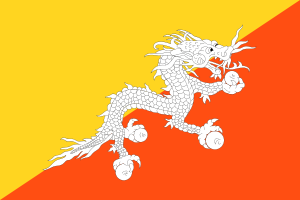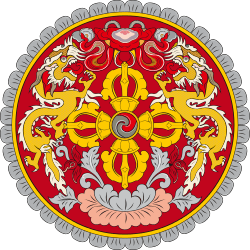Media of Bhutan
| Part of a series on the |
| Culture of Bhutan |
|---|
 |
| History |
| People |
| Languages |
| Cuisine |
| Religion |
| Art |
|
Music and performing arts |
| Sport |
|
The various media of Bhutan have historically been government-controlled, although this has changed in recent years. The country has its own newspapers, television and radio broadcasters and Internet Service Providers.
Journalism
The Kuensel, a newspaper of a government-owned corporation, circulates six days a week in Dzongkha and English. Beginning in April 2006, it competes with the Bhutan Times, Bhutan's first government-authorized privately owned newspaper. In late 2006, another private newspaper, the Bhutan Observer began publication. The Bhutan Today, an English daily newspaper launched in October 2008. In late September 2009, the first Financial Newspaper of Bhutan was launched with the name Business Bhutan.
People working in media in Bhutan receive short term journalism training from Britain, The Netherlands, India and Singapore. Bhutan is said to be a place where the government says they care about the people but journalist might differ especially in the newspaper business. At the beginning of the newspaper there used to be hundreds working as of now you can count them on one hand. The newspapers depend on the government for about ninety percent of their revenue.[1]
Radio and television
The Bhutan Broadcasting Service was established in 1973 as a radio service, broadcasting in short wave nationally, and on the FM band in Thimphu. The service started television broadcasts in 1999, making Bhutan the last country in the world to introduce television. As part of the King's modernization program, cable television was introduced shortly after. By 2002, however, the crime rate had increased appreciably, and the introduction of cable television is alleged to be responsible for the spurt in crime.The Bhutan Broadcasting Service (BBS) has been expanded and will be available Bhutan and will also be available in the region. The signal can be received in almost 40 other countries from Turkey to Indonesia. The Bhutan Broadcasting Service has now assumed the role of a true national broadcaster said by the minister of information and communications. In 2008 the adoption of the constitution by Lyonpo Leki Dorji meant that the BBS would now be taking on a more pivotal in educating the public. When they took the role to educate the public this meant they had to improve the quality of news and programs because it became imperative. Sudhir Vyas, ambassador of Bhutan, thinks India is privileged to be associated with the development of media in Bhutan. The launch was a true testimony and the support the government had for the media. This symbolized the role that the government played in the development of Bhutan. The Bhutan Broadcasting Service has also to been said to be the cheapest and easiest way to educate people.[2]
Electronic media
The Internet was government issued to DoT MoC in April 1999. They were given until June 2nd 1999, giving them only 3 months to get done.[3] Bhutan has about 295,000 Internet users, 25,200 landline subscribers, and 676,000 mobile phone subscribers.[4] Bhutan's only Internet Service Provider is Druknet which is owned by Bhutan Telecom. The mobile subscriber in 2014 was at a good and strong 14%. As the market has begun to mature in 2015 it was a slow 5% and 2% in 2015 and 2016, as market penetration reached 88% in 2016. It has been predicted in the next 5 years or so there will be a moderate growth. Over this time the mobile subscriber have reached in excessive of 100% at times. The internet access in the country has had a major boost by mobile networks, largely by EDGE/GPRS and the new 3G technology platforms. Even though this is the case now because they have been isolated from the rest of the world for a long time until the 1990s. The fixed telephone lines is declining in Bhutan from a small base as the mobile segment keeps expanding. Penetrations has dropped over the years as in 2014 dropped to 3.1%, 2015 dropped to 2.9%, and 2016 dropped to 2.7%. Internet in Bhutan developed down a slow path during the beginning of the internet because the country embraced the internet cautiously which is still continuing to be low because the country is struggling economically. Fixed broadband penetration is increasing from a small base as it has continued over the past few years. Penetration has increased 2.3% in 2012, 3.1% in 2014, 4% in 2016, and is predicted to grow in the next five years until 2021.[5]
Film
"Gasa Lamai Singye" was the first film movie made by Ugyen Wangdi the founder of the Country's fledgling cinema in 1989. The Bhutanese lama Dzongsar Jamyang Khyentse Rinpoche is a well-known filmmaker, who produced and directed The Cup and Travellers and Magicians. While The Cup was shot in a Tibetan monastery in northern India, Travellers and Magicians was the first feature film to be filmed entirely in Bhutan, with a cast consisting entirely of Bhutanese people. No professional actors were used in either film. Historically, films in Bhutan were often adaptations of Bollywood films however in recent years film makers are aiming at defining Bhutanese cinema, nevertheless influence from Bollywood is still a major inspiration.[6] More recently the popularity of Korean dramas have also had some effect on Bhutanese cinema.[7]
References
- ↑ http://blogs.wsj.com/indiarealtime/2013/10/20/why-journalists-are-unhappy-in-happy-bhutan/. Missing or empty
|title=(help) - ↑ Bhutan broadcasting service launches nationwide TV. (2006, Feb 20). BBC Monitoring South Asia Retrieved from http://search.proquest.com/docview/459899115
- ↑ Thinley, Jichen. "History of the Internet." The Internet for Surgeons (n.d.): 5-9. http://nog.bt/btnog1/presentations/history-keynote.pdf. 17 Nov. 2004. Web. <http://nog.bt/btnog1/presentations/history-keynote.pdf>.
- ↑ https://www.cia.gov/library/publications/the-world-factbook/geos/bt.html. Missing or empty
|title=(help) - ↑ "Bhutan Telecoms Mobile and Broadband".
- ↑ Stancati, Margherita. "Does Bhutan Love Bollywood Too Much?".
- ↑ "The Raven".
- Radio Valley goes on air - Kuensel
-
 This article incorporates public domain material from the Library of Congress Country Studies website http://lcweb2.loc.gov/frd/cs/.
This article incorporates public domain material from the Library of Congress Country Studies website http://lcweb2.loc.gov/frd/cs/.
